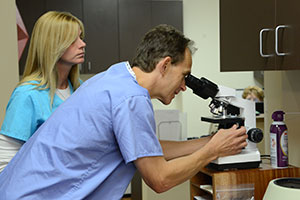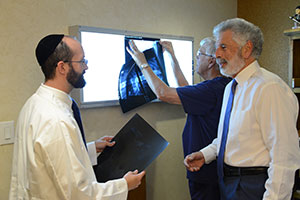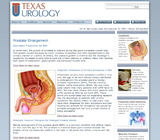|
||||||||||||||||||
About the prostate
In most settings, the prostate doesn't come up in casual conversation, so you may know little about this internal organ. Like many men, you may be prompted to learn about it because you have heard that men over the age of 50 are more likely than younger men to have "prostate trouble". You may also have noticed changes in your urinary habits that have made you wonder, "Is something wrong?" or "Should I see my doctor?" Whether you are worried about your prostate or simply curious, the following information is intended to help answer your questions. WHAT IS THE PROSTATE AND WHERE IS IT LOCATED IN THE BODY? Only males have a prostate. It's a gland in the male reproductive system located just below the bladder, the organ that stores urine. The prostate surrounds a part of the urethra, the tube that carries urine from the bladder out through the penis. WHAT DOES THE PROSTATE DO? The prostate makes it possible for a male to father children. As most people know, the testicles produce sperm. What most don't know is that the prostate contributes to the milky fluid that helps to carry the sperm. This sperm-containing fluid is also thought to supply nourishment for the fragile sperm and to help make the vaginal canal less acidic. All of these factors increase the likelihood of conception. In fact, since the prostate contributes to the ejaculate throughout the better part of a man's life, many men are able to father children well into their 70's and 80's. Healthy Heart also Means a Healthy Prostate Gland Heart disease is the number one killer of men and women and, interestingly enough, research has shown that a healthy heart also turns out to be a healthy prostate gland. Since heart disease is also the number one cause of death in men diagnosed with prostate cancer, if you become more heart healthy you may get a “twofer” effect. In other words, now you are doing more to prevent some of the leading causes of early death. In this article I will review some of the ways of reducing the risk of heart disease and possibly improve your prostate health as well. 
[Top] THE MANY STAGES OF THE PROSTATETHE PROSTATE AT BIRTH When a male is born, his prostate is about the size of an almond. It remains that size throughout childhood. THE PROSTATE AT PUBERTY During puberty, the prostate begins to enlarge and approximately doubles in size; then growth slows. This is normal. The prostate is preparing for its main role in life: sexual reproduction. At about the same time that the testicles are able to produce sperm, the prostate is sufficiently mature to produce the seminal fluid that will support the sperm. THE RENEWED GROWTH OF THE PROSTATE AT MIDDLE AGE At about age 45, the prostate often starts growing again and, in some cases, can continue to enlarge for the rest of a man's life. It's generally accepted that this growth is influenced by hormonal changes. By itself, prostate enlargement isn't a problem; but the prostate gland surrounds the first section of the urethra, the tube that carries urine from the bladder out through the penis. As the prostate continues to enlarge, it can frequently start to squeeze the urethra (like pinching a straw). This can interfere with the normal flow of urine and can cause uncomfortable symptoms. An enlarged prostate generally does not interfere with sexual functioning. However, severe urinary symptoms can be embarrassing and can inhibit a man's sexual activity. THE PREVALENCE OF AN ENLARGED PROSTATE IN LATER LIFE Not every man develops an enlarged prostate, and, in those men who have the condition, it's not always progressive. However, a major medical study showed that four out of every 10 men over age 55 have an enlarged prostate. The number jumps to seven out of 10 in men in their 70's; by age 80 it's even higher. THE URINARY SYMPTOMS OF AN ENLARGED PROSTATE The symptoms commonly associated with an enlarged prostate are frequent urination, especially at night, or the sudden, almost uncontrollable urge to urinate. This is because in the early phase of prostatic enlargement, the bladder muscle has to force urine through the narrowed urethra by contracting more forcefully. Over a period of time, the forcing causes the bladder muscle to gradually become stronger, thicker, and overly sensitive. This creates a need to urinate more frequently. The added pressure on the urethra can also cause a weak, interrupted urine stream, a sense of incomplete bladder emptying, leakage, and difficulty in starting urination. An enlarged prostate can even result in total blockage, a very serious condition. [Top] THREE PROBLEMS OF THE PROSTATEAlthough there are several diseases of the prostate that can develop, these three very different problems are the most common: PROSTATE ENLARGEMENT Prostate enlargement is a benign condition. Its medical name is benign prostatic hyperplasia (BPH). BPH is most commonly found in men over the age of 45. BPH is not cancer and does not turn into cancer. However, a man can have BPH and prostate cancer at the same time. As previously discussed, hormones in the prostate are generally thought to be involved in the growth of new tissue which can enlarge the prostate and can "pinch" the urethra. This, in turn, can create bothersome symptoms. After proper diagnosis, many enlarged prostate conditions can be improved by a spectrum of different treatments. While you may have an enlarged prostate, you may have no symptoms or symptoms that are disturbing to some degree. If this is the case, you and your doctor may decide on a program of "watchful waiting," which involves only periodic checkups. If your symptoms are more bothersome to you, any one of a number of treatments (surgical and nonsurgical) might be recommended. The non surgical treatments are medications that relieve the obstruction to the flow of urine caused by the prostate enlargement. One drug, Proscar, shrinks the prostate slowly by blocking the hormone action that creates prostate growth. Proscar has very few side effects and takes about three to four months to work. Once it works, it maintains the shrinkage as long as the drug is continued. Another set of drugs, Hytrin and Cardura, are blood pressure medications that act to relax the muscles around the prostate channel. These medications work more quickly but have some side effects including low blood pressure and dizziness. These also have to be taken indefinitely. The surgical treatments, of which there are many, involve removal of prostate tissue by cutting, laser, heat, or microwaves. Some of the procedures are more complicated than others and require a detailed explanation from your physician. Only your doctor can properly diagnose your condition and recommend an appropriate treatment for your consideration. PROSTATITIS Prostatitis is an entirely different condition from an enlarged prostate. Prostatitis is an inflammation of the prostate which may be caused by the presence of a bacterial infection. This condition can affect men of all ages. Having prostatitis does not increase your risk of getting any other prostate disease. Some of the symptoms of prostatitis are similar to those caused by an enlarged prostate, such as the frequent urge to urinate, yet difficulty in doing so; but prostatitis can also be accompanied by chills and fever (in acute infections) and by pain or burning during urination. Treatments are available-consult your doctor. PROSTATE CANCER Prostate cancer is a serious disease because it is a malignant condition. Malignant tissue is present in the prostate, and the malignancy can spread to other parts of the body. While prostate cancer can occur in men of all ages, it is most commonly found in men older than 40 years of age. In its early stages, prostate cancer may not cause urinary symptoms. It is usually detected during a routine rectal exam or by the use of a screening blood test called PSA or Prostate Specific Antigen. When caught early, prostate cancer has an encouragingly high cure rate. In its advanced stages -- when cure is most difficult -- prostate cancer may produce symptoms that are similar to an enlarged prostate. Approximately one out of every 10 American men develops prostate cancer. More than 30,000 die annually from this disease. A wide range of techniques can be employed to treat prostate cancer, including surgical removal of the diseased prostate. [Top] WHAT EVERY MAN SHOULD DOEvery man age 50 or older (age 40 or older with a family history of prostate cancer) should ask about the pros and cons of screening for prostate cancer. The screening program includes a rectal exam and a PSA blood test. These, coupled with a frank, open discussion of any changes in urinary habits, will better enable your doctor to diagnose your problem. WHAT YOUR DOCTOR WILL DOOnce you've given your doctor a detailed description of any symptoms that you may be having, the doctor will examine your prostate as part of your exam. Since the prostate is located near the rectum, the doctor can feel the prostate by inserting a gloved, lubricated finger into the rectum. This simple exam helps the physician to determine whether the prostate is enlarged or if it has lumps or areas of abnormal texture. He will also be able to evaluate your PSA level and determine if further tests or consultation is needed to rule out a prostate cancer. If you already have urinary symptoms (especially if they are persistent), you should consult your doctor sooner. Your doctor may recommend additional tests and, if necessary, refer you to a urologist. [Top] WILL PROSTATE DISEASE AFFECT MY LIFE - OR MY LIFESTYLE?Early diagnosis of the most serious prostate disease-prostate cancer--increases the chances of a cure. Early treatment may save your life as well as your lifestyle. In many cases, treatment for prostate cancer will not affect your sex life or your ability to control urination. By the same token, you need not suffer from bothersome symptoms of an enlarged prostate (BPH). Such symptoms are not a necessary part of getting older. There are a number of treatments available, and the choices are increasing every year. So today, more than ever, prostate disease doesn't necessarily have to interfere with your life or your lifestyle. If you have any questions about prostate disease it's important to discuss these with your doctor as soon as possible. Your doctor is the best person to diagnose your particular condition and counsel you on a proper course of action. [Top]
Quick navigation links: What is a Urology Center | Urologist | Urology Conditions | Urology Services | Resources for Health | Contact Urology Center in North Texas | Sitemap | Home Disclaimer: The pictures displayed in www.TexasUrology.com are images of actual patients and employees who have consented to have their picture in this website.
|
|
|
|
|
||||||||||||||



